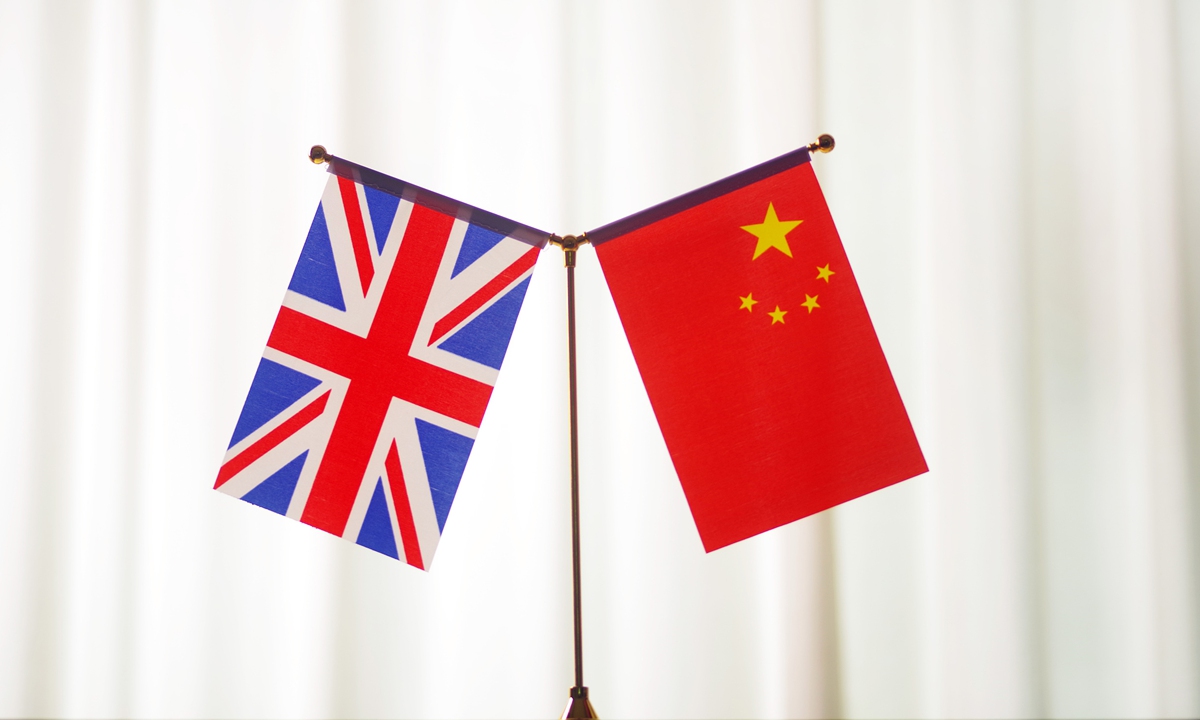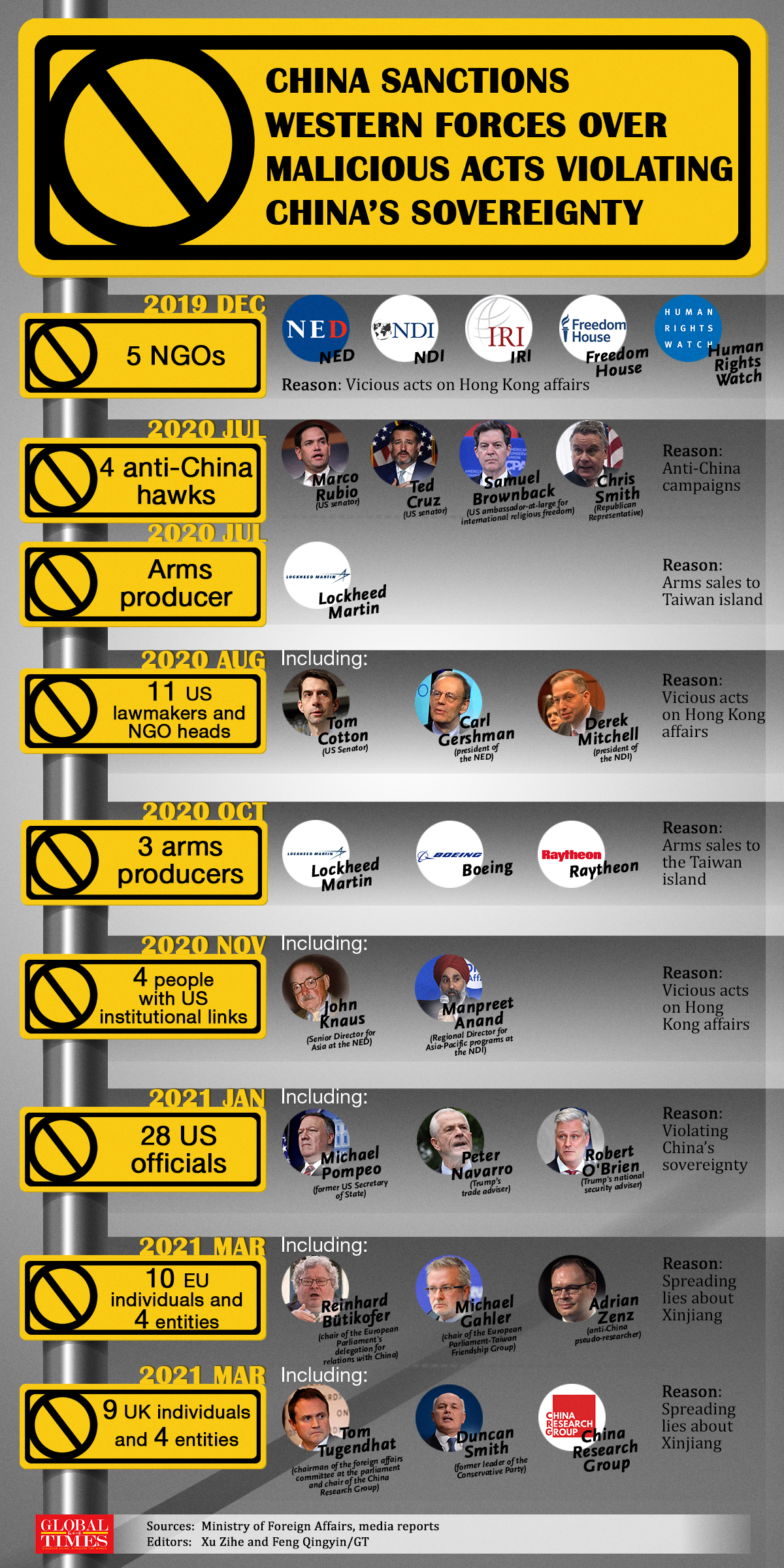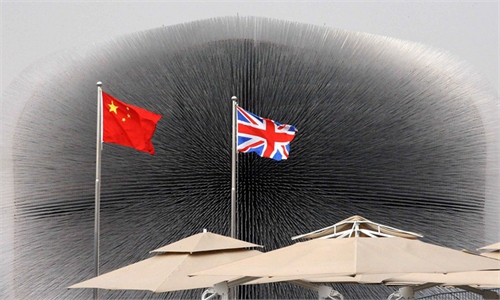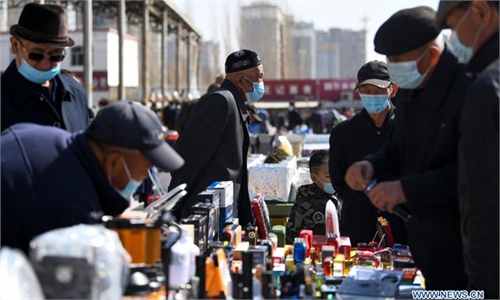China’s sanctions on UK not retaliatory; further countermeasures against ‘UK lawyers and Canadian MPs’ on the way

China UK Photo:VCG
China's countermeasure of sanctioning nine UK individuals and four entities was a reciprocal move based on evidence and an equal relation with nations that the West must get used to, Chinese analysts and sources said, warning that more countermeasures are on the way against certain UK lawyers who have colluded with overseas anti-China organizations, and Canadian parliament members who led the Xinjiang-related motions.
China on Friday hit back after the UK's unilateral move of sanctioning Chinese individuals and entities over Xinjiang affairs, to sanction nine UK individuals and four entities including chairman of the foreign affairs committee Tom Tugendhat and other MPs and scholars who have spread lies and rumors about China's Xinjiang region, and some major think tanks that have played infamous roles in the matter.
The individuals concerned and their immediate family members are prohibited from entering the Chinese mainland, Hong Kong and Macao. Their properties in China will be frozen, and Chinese citizens and institutions will be prohibited from doing business with them. China reserves the right to take further measures.
Chinese Foreign Ministry Spokesperson Hua Chunying stressed at Friday's media briefing that China's determination to safeguard its national sovereignty, security and development interests is unshakable.
China urges the UK not to go further down the wrong path; otherwise, China will make a further firm response, Hua said.
The foreign affairs committee has launched unreasonable inquiries into Xinjiang affairs citing "forced labor," and is behind many foreign policies coercing China over Xinjiang. Tugendhat had referred to nonexistent "massive detentions of Uygurs" as "echoes of the 1930s."
The China Research Group, which many of the sanctioned individuals are connected with, is a newly set clique which includes conservative MPs and some researchers. The aim of the group is to urge the UK government to take a tougher stance on China.
Essex Court Chambers, after consulting with secessionist terrorist organization World Uyghur Congress (WUC), authored a legal opinion concluding that China's policies in Xinjiang constitute "genocide."
Zhu Ying, deputy director of the National Human Rights Education and Training Base of Southwest University of Political Science and Law, told the Global Times on Friday that the sanctions that China imposed on the British MPs and entities are very targeted, and were based on evidence and facts that they proposed anti-China motions or legislations or made unreasonable demands to our embassies abroad.
Their behavior is a serious interference in China's internal affairs and sovereignty, which is completely detrimental to the normal diplomacy between the two countries, Zhu said.
Aggravating tensions with the West?
The West seems uneasy about China's recent sanctions against the EU and UK. An AFP journalist asked Foreign Ministry Spokesperson Hua why China's sanctions have become fiercer and targeted a wider scope than the UK's sanction targets. Hua said China is not the one who initiated provocations, and is the one who is forced to retaliate in self-defense.
And some Western countries should not have been surprised because China repeatedly told them the truth but they preferred the rumors and lies cooked up by a small number of anti-China forces, Hua said.
"Since they don't listen to what we tried to explain over and over again, I think the best way is to respond in a way that they can understand and remember," Hua said.
Hua said she sensed that countries like the UK and the US were not used to China's changes, as they have long been used to criticizing or sanctioning other countries without being hit back, which is unequal.
"They may be not used to it now, but gradually they should be," Hua said.
Shen Yi , a professor at the School of International Relations and Public Affairs of Fudan University, told the Global Times that some people in the West may think the sanctions from China would aggravate tensions between China and the West, but the fact is that sanctions and counter-sanctions are normal for equal powers, and the West practices was suzerain-vassal relations, which was rather sick.
"China's countermeasures were a necessary step to normalize China's relations with Western countries, and not hitting back when facing smear and sanctions will worsen bilateral relations. China is telling the West through these measures that gone are the days when anyone can discredit and damage bilateral relations without paying any real cost," Shen said.
Chinese analysts said China will follow through and has made preparations no matter what the West will do next.
Sanctions and counter-sanctions between China and the West will last for a long time, including on Hong Kong and other issues, Cui Hongjian, director of the Department of European Studies at the China Institute of International Studies, told the Global Times, noting that through those countermeasures, China aimed at completely reversing the situation that Western countries have been wantonly interfering in China's internal affairs through the so-called "human rights issue."
Through those countermeasures, China is attempting to establish a new model and rules for exchanges with Britain, Cui said. "The previous state of concealment and disguise has faded away, just open the window and tell the truth."
Martin Jacques, who was until recently a Senior Fellow at the Department of Politics and International Studies at Cambridge University and is a Visiting Professor at the Institute of Modern International Relations at Tsinghua University and a Senior Fellow at the China Institute of Fudan University, told the Global Times on Friday that he understands China's response, which is restrained and appropriate.
China does not want to show weakness in the face of Western attacks on it. China's history has taught it this, he said.
"But let me pose a wider question. There is the danger of what I will call the slippery slope, a relentless deterioration in the relationship which is what has been happening over the last few years," Jacques said, noting that tit-for-tat measures are not always the best way, however justified they might be, and that sometimes restraint is a better and more effective way to deal with such attacks.
The challenge is how to isolate the Cold War forces, epitomized, for example, by the China Research Group (in the Tory Party), and strengthen those voices in the UK (or wherever indeed) that believe in engagement with China, he said.
Cui said that the ball is in Britain's court, and it's an opportunity to test the UK government's balanced policy toward China.
He Zhigao, a research fellow with the Institute of European Studies, Chinese Academy of Social Sciences, told the Global Times that once the sanctions against each other start, they will hardly end, and the conflicts between China and the UK will last for a long time.
"The Boris government will find it more and more difficult to strike a balance between politics and economy in relations with China. Moreover, some UK MPs or anti-China forces are anticipated to impose pressure on the government. Therefore, future China-UK relations not only depend on the coordination between Europe and the US, but also the policy coordination within the UK," said He.
More sanctions on the way
A source close to the matter told the Global Times that China has obtained solid evidence that some British lawyers colluded with anti-China organizations, and will target them for future countermeasures.
Rodney Dixon, the lawyer of two anti-China organizations "East Turkistan Government-in-Exile" and "East Turkistan National Awakening Movement," and Michael Polak, another UK-based lawyer who represents the WUC, are likely to be sanctioned by China, the source said, noting that they have collected the related evidence for two years and have submitted it to related government departments.
China is also preparing for sanctions against some Canadian parliament members, such as Michael Chong who introduced a Xinjiang-related motion, the source said.
Zhu stressed that China's countermeasures are not retaliatory, as China did not do any pre-emptive sanctions and all the countermeasures are applied on the basis of facts and evidence.
Zhu said China is also setting up a fine example for other developing countries that we have to raise our voice of justice in face of bullying and unreasonable sanctions.
China's sanctions are also a step for China to take a greater initiative in international human rights and more actively express our own human rights discourse and values so that international society would learn about China's true human rights value, Zhu said.
We can make more countries understand that the discourse of human rights was not just based on Western standards, but was pluralistic, multicultural and multi-ethnic, he said.

China's list of sanctions against Western forces over their meddling in China's domestic affairs related to HK, Taiwan and Xinjiang. Graphic: Xu Zihe and Feng Qingyin/GT


